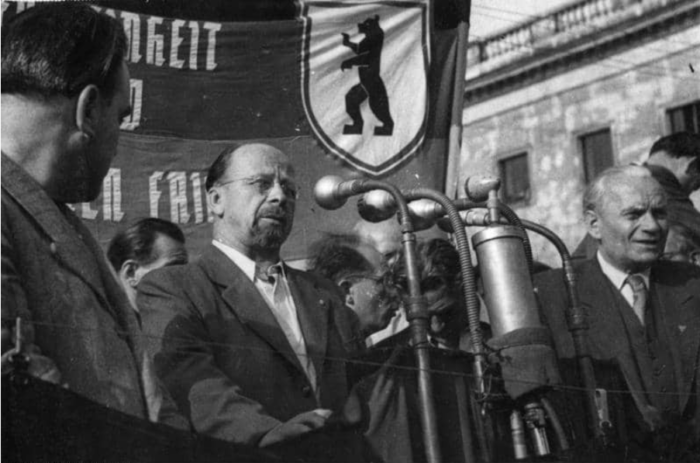We teamed up with the Unknown History podcast on Quick and Dirty Tips to bring you their latest series based on Giles Milton’s Checkmate in Berlin. Episode 5 delves into a small but dedicated group of Russian-trained German revolutionary communists in Berlin in 1945. Their role was to wrest control of all the key institutions in the city, setting the stage for a violent struggle between East and West. Read more below.
When Frank Howley first arrived in Berlin in July 1945, he had no idea that the Russians had spent the last ten years training a small but dedicated group of German revolutionary communists.
The role of this group, which had spent a decade of exile in Moscow, was to wrest control of all the key institutions in Berlin. Working in secret, they were to place every institution under Communist control, while keeping up the pretense that power was being shared between the four occupying powers.
The leader of these German revolutionaries was Walter Ulbricht, a Communist down to his fingertips, who had impeccable revolutionary credentials. He had fled to the Soviet capital eight years earlier, when life in Hitler’s Germany grew too tight for comfort, and he was soon smuggling anti-Nazi agents back into Berlin. In Moscow, Ulbricht became known as “Comrade Cell,” on account of his gift for organizing networks of underground agents.
Some questioned if he was the right man for a mission that would require charm and charisma. Attired in the shapeless suit of a party apparatchik, Ulbricht was chillingly deficient in both. “I seldom saw him laugh,” said one in his circle, “and I do not remember ever having detected any signs of personal feelings.” Another concluded that he was “not a nice man . . . [and was] a tireless weaver of intrigues.”
This intriguing had left Ulbricht a loner: “from his schooldays onwards, he never had a single personal friend.” He had managed to acquire himself a wife, known as “Comrade Lotte,” but she was loathed by everyone at the Hotel Lux.
Ulbricht had the dogmatic asceticism of a desert monastic. He didn’t drink, didn’t socialize, didn’t eat meat or fish. His mealtime preference was for raw vegetables, a dietary regime that even his most diehard comrades found hard to stomach. According to one, “he never gave cocktail parties, never had affairs and even gave up smoking as a drain on his revolutionary activities.”
When he spoke, he did so in a curiously high-pitched voice, dispensing revolutionary wisdom in his singsong Saxon dialect. His judgment was final and irrevocable. “He has the last word always, interrupting everybody [and] heckling speakers he dislikes.” He was the prototype for so many future leaders of Eastern Europe: grim, ashen-faced, and entirely devoid of humor.
Ulbricht and his fellow revolutionaries had arrived in Berlin on the tail of the victorious Red Army and had displayed a steely sense of purpose since the very first day, focusing their energies on gaining mastery of the police, the mayoral offices, and the trade unions. Ulbricht had done this with the active support of the Soviet Military Administration, but his work was now complicated by the arrival of the Western allies.
Frank Howley’s agents were keeping a close eye on the Soviet-trained revolutionaries, reporting back each new piece of intelligence. The first alarm bell sounded when it was discovered that Ulbricht’s police chief, Paul Markgraf, was a Nazi turned Communist. “In this way,” said Howley, “the Berlin police force was added to the Communist ranks, giving them a powerful weapon.”
Next, it was discovered that Ulbricht had placed the judiciary in the hands of a Communist activist named Mittag. Herr Mittag had no legal training—he was a locksmith by profession—but he had years of experience in coercion. Howley’s assessment of the chief judge was scathing. “In the United States, I doubt if Mittag, controller of all courts, would have got through grammar school.”
Ulbricht had also created a Free German Trade Union Federation, a body that was anything but free, given that all union members were required to join. “It bore no resemblance to the unions of the United States,” observed Howley, who was told it was “an organization with dictatorial powers.”
To learn more about the history of World War II, visit Unknown History on Quick and Dirty Tips. Or, you can listen to the podcast below.

